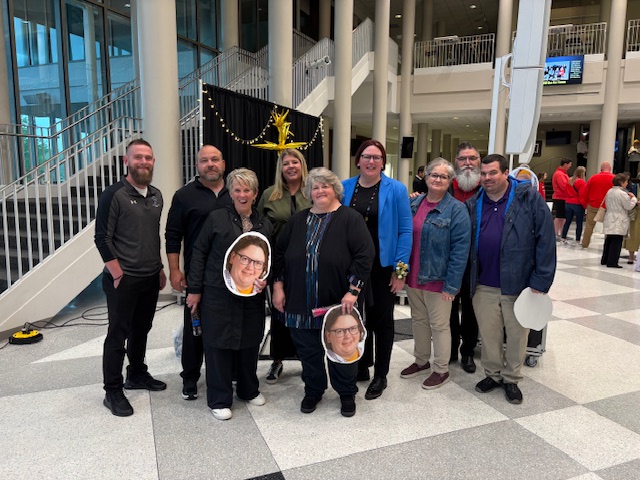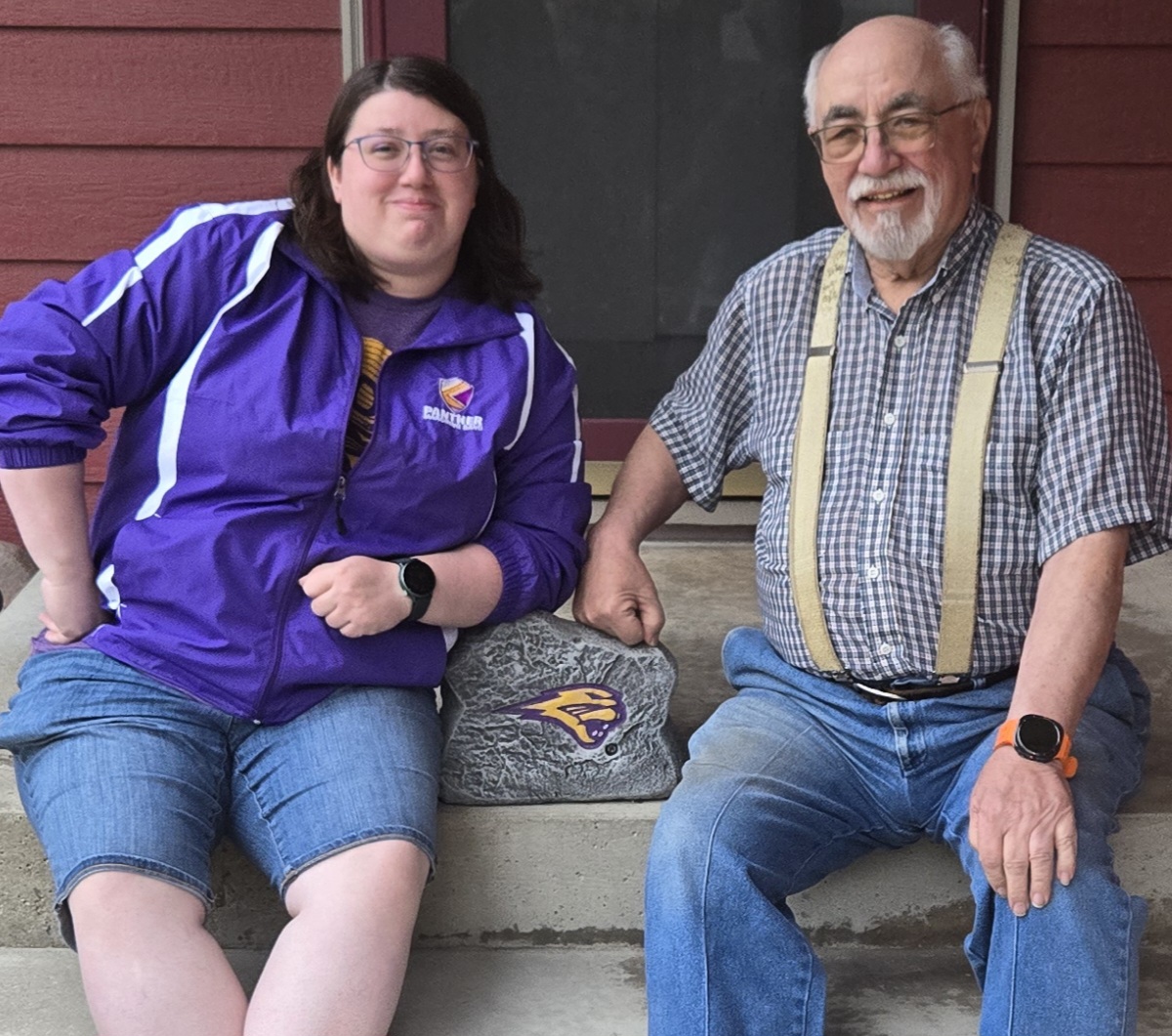A Shared Bond, A Special Legacy
A Shared Bond, A Special Legacy
Generations of UNI educators can be found among the thousands of Panther alumni. For many families, that legacy is truly generational — beginning with relatives who earned two-year teaching certificates and continuing through second and third generations who earned bachelor’s degrees and beyond.
For some families, it’s a straight line: grandmother, mother, daughter. For others, it’s a cousin, aunt, uncle or grandfather. And while elementary education finds common ground with many, the spectrum of teaching disciplines is evident in the variety of degrees received.
Several families shared snapshots of their unique ties to UNI and to the teaching profession. For each story, there are countless others — each with its own journey and set of memories. But all are connected by a shared bond: they are Panther teachers and educators who have inspired children across Iowa and beyond and left a lasting legacy.
As we launch the 150th anniversary of UNI, we begin with the profession that started it all: teaching.
Purple passion runs deep
For UNI alumni, the purple passion runs deep and long — particularly for the teaching alumni whose roots trace back to 1876. And for good reason. Throughout its history, UNI’s reputation in teacher education has made it an easy choice for prospective students, generation after generation.
“I knew it was a strong education school, and I knew my aunt and grandmother had gone there. I didn’t look at or apply to any other schools. UNI was my one and only,” says Rachel Martin, (‘00 BA, elementary education), whose grandmother, Mary Jean (Quinn) Martin started her family’s teaching tradition with a teaching certificate earned in 1948.
Doxie (Godden) Weber (‘71 BA, elementary education), shares similar thoughts: “My uncle Keith (‘51 BA, science education) always knew he wanted to be a teacher, and Iowa State Teachers College is where you went in Iowa if you wanted to be one.”
Within six families who responded to a survey asking about generations of teachers, 22 teachers represented 10 different teaching majors, with half of them in elementary education (counting those who earned teaching certificates). Ten more non-teaching UNI graduates complete their family circles.
Since 1876, UNI has produced more than 60,000 teaching alumni, including thousands from the College of Education. Though representing a tiny fraction of these alumni, their thoughts mirror the memories of many. For these UNI graduates, the word “legacy” carries genuine weight as alumni of the state’s largest teacher education program.
“It’s pride. I get to say this is something that’s been in my family for decades. And I love meeting other teachers who say they went to UNI,” Martin says. “I love being part of that legacy and sharing with my current students about why they should go to UNI. I still keep in contact with my own friends from UNI. I have so many positive memories from being there.”
Emily Borcherding, (‘07 BA, math and Spanish teaching, ‘12 MAE, postsecondary education: student affairs) followed in the teaching footsteps of her

mother Raelene Borcherding (‘73 BA, English education) and her grandmother, Mabel Siefkas Morgan, who earned a teaching certificate in 1944.
The UNI legacy, she says, “means we are well prepared — and there is a network and community to go to for support if we need it. UNI is such a strong community and such a supportive and quality teaching network.”
“It’s something of which I’m very proud,” says Ruth Koenigsberg Maxedon (‘72 BA, elementary education). She, like her sister Ladine Koenigsberg Elwood (‘78 BA, elementary education) followed her mother Loretta Schwartz Koenigsberg, to UNI. Her daughter, Kristianne Maxedon Buck, earned her master’s in teaching English to students of other languages (TESOL) at UNI.
“We three generations really enjoyed our time at UNI with the excellent education for our careers and the friendships we made. It’s been a treasure to have gone through the university. As a distance education student, my daughter appreciated the measures taken by the instructors to help her excel and successfully complete her program.”
“Everyone who went to UNI from my family felt they got a good education and a good start to their careers. For me, it always felt like my second home. UNI served me well,” adds Weber.
It's pride. I get to say this is something that's been in my family for decades. And I love meeting other teachers who say they went to UNI. I love being part of that legacy and sharing with my current students about why they should go to UNI. I still keep in contact with my own friends from UNI. I have so many positive memories from being there.
Why teaching?
Not surprisingly, the familiarity with teaching as a profession within these families influenced some choices made by succeeding generations. Depending on the timeframe, teaching was also one of the few options for women in the families. But that core passion to teach played a role as well.
“Having so many educators in the family and hearing their stories inspired me. I grew up playing teacher with my brothers and sisters. We had old desks from a college nearby, and every summer we’d play,” Martin recalls.
“For me, in 1968, my choices were secretary, teaching or nursing. UNI had the best reputation with their teacher education program and was available to me,” Maxedon relates. “I had grown up playing teacher and had a 5th grade teacher who was a big influence. She made learning fun. I wanted my own students to have as much fun as I did.”
Allia Yarrow (‘15 BA, biology education) was inspired by her grandfather, Keith Yarrow, (‘63 BA, secondary teaching, ‘71 MA mathematics), and aunt Lisa Yarrow, (‘91 BA elementary education and health education, ‘98 MA, health education).
“I visited my aunt sometimes after elementary school. She worked in the connected middle school at the time as a science teacher, and I loved seeing her classroom and the activities they were up to,” she says. “When I was a sophomore in high school, we were asked to do research on careers we might find interesting as part of our benchmark speeches, and I interviewed my grandfather about teaching. I learned a lot about the profession from him.”
Borcherding’s mother Raelene always wanted to be an English teacher. “Reading, writing stories and diagramming sentences brought her happiness,” she says. For her grandmother, however, teaching was an opportunity among limited choices at a different time, in the 1940s. But she also loved what she chose. “As one of 10 children, she and several of her sisters chose teaching as a post-Depression way of supporting themselves financially,” Borcherding says. “She loved teaching fifth grade and loved math. She thought she was pretty good at it; so good at it that she challenged a math professor to a tennis match. If she won, she received an A in his class. She lost the match, but did receive the A!”
I don't think anything beats having students tell you at the end of their four years that you made a difference in their lives--that you challenged them and they've become doctors because of it, or that you've opened their eyes to career paths they'd never thought were for them or that you simply just believed they could pass your class or even graduate."
The right choice

Career trends ebb and flow. Even teaching, which contributes to society’s educational foundation, has had its moments of flux. At these times, these teachers remind themselves and others of the moments that encouraged them throughout their careers.
“When a parent would let me know that their child loved being in my class or loved doing a certain project or activity, those comments are heartwarming, to say the least. It makes a teacher feel appreciated,” says Weber.
“I don’t think anything beats having students tell you at the end of their four years that you made a difference in their lives — that you challenged them and they’ve become doctors because of it, or that you’ve opened their eyes to career paths they’d never thought were for them, or that you simply just believed they could pass your class or even graduate,” says Yarrow. “That sort of tangible change is something undeniable. Those moments are the reason I know I made the right choice.”
As the 150th class enters UNI this fall, the next generation begins its journey to add to the legacy of UNI Teacher Education. Their forebears wish them well.
“Just keep growing and improving yourself,” Martin advises. “The teaching profession is always changing, and you have to be able to change with it.
A teaching certificate begins a career

Florence (O’Mara) Koch, from Cambridge, Iowa, has a story like so many Panther teaching alums “of a certain age.”
She graduated from high school at age 16. Daughter of a former teacher and librarian, she went to the Iowa State Teachers College, aided by a scholarship her high school superintendent helped her earn. She completed her two-year teaching certificate in upper elementary education in 1954.
Koch married, eventually earned her BA from Drake University and taught for 26 years. In Iowa, that included positions in State Center and Colo — teaching all grades K-7 — before she moved to Arizona in 1986. There she taught in a one-room schoolhouse up a mountain road from Tucson at the top of Mt. Lemmon, which served the local community and resort families. Through the years, she also worked as a legal assistant, volunteered at an art museum, and, always active, served as president of the Women’s Golf Association in Arizona.
“A lot of change came around in my lifetime,” she says, noting the first computers at school. She was known for welcoming challenges. “One day, one teacher came to my room and said, ‘Florence, I have seven boys beyond my need this year, would you take them? I was told if anyone can, Florence can.’ And I did, for several years.”
Now 93, Koch fondly remembers good professors and student teaching in Waterloo. “Cedar Falls is a great school. I always felt at home, felt very good being there, loved it, and my family all came to see me graduate. It was really a great privilege to graduate from there. If I had lived closer, I would have tried to get my BA. I came back for my 50th with my ex-roommate, we just had a wonderful time,” she says.
Following Koch to UNI was her son Jeff Koch (‘80 BA, history teaching) and granddaughter Amanda Burns (‘10 BA).




